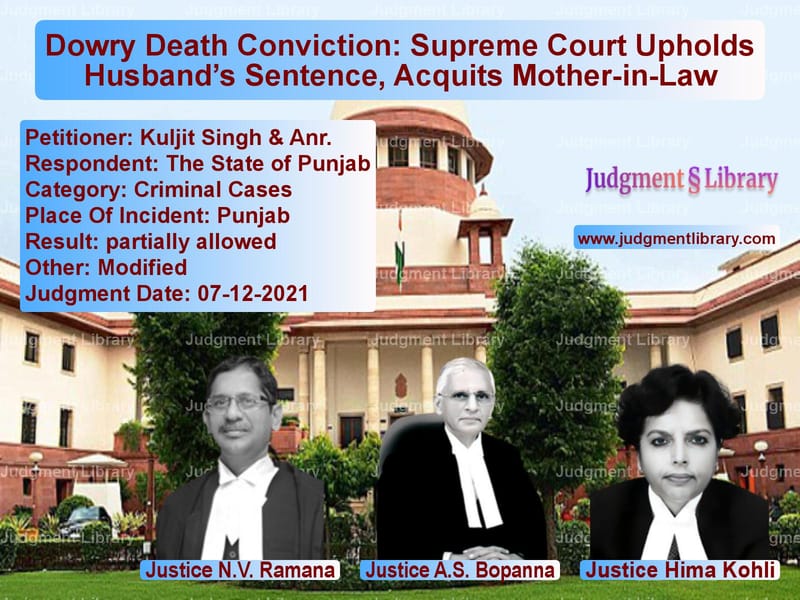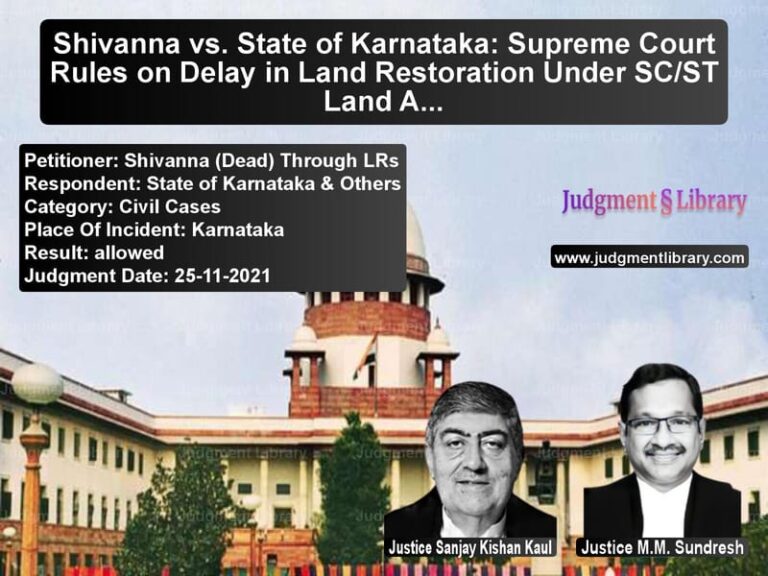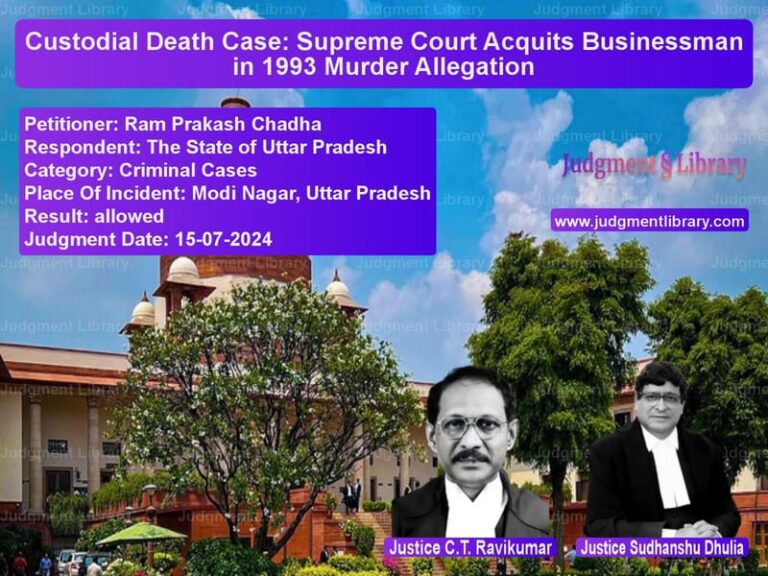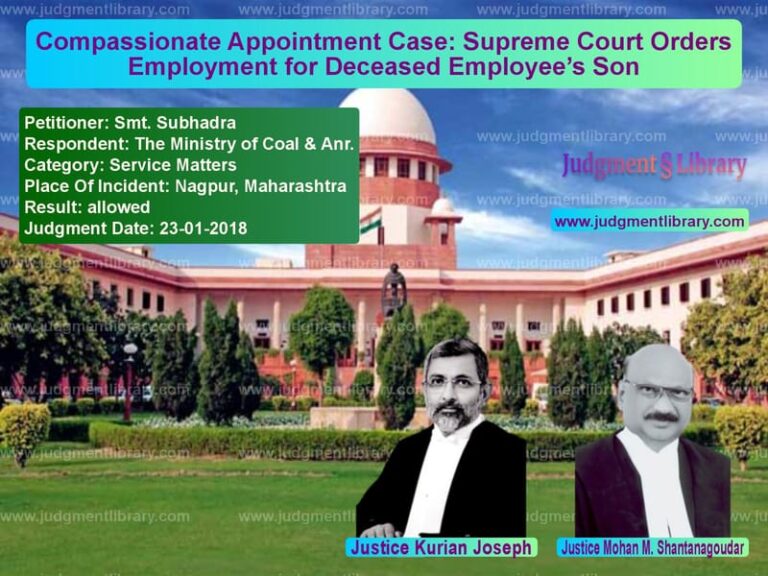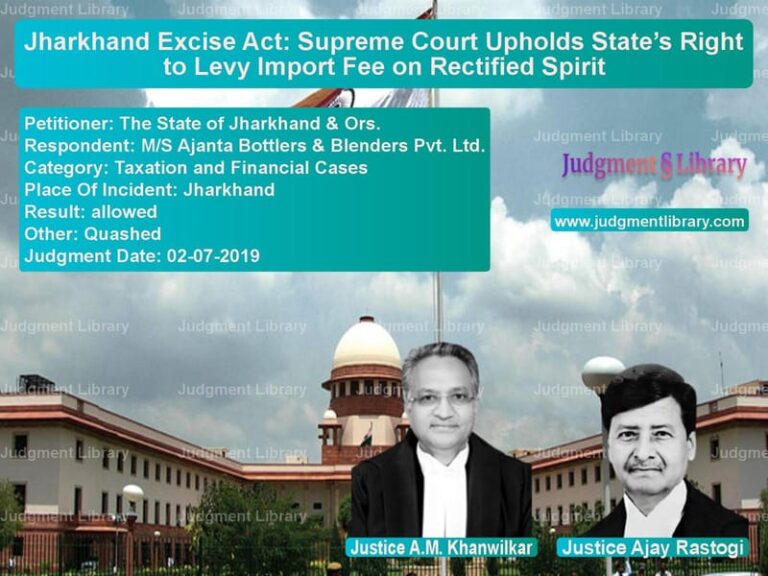Dowry Death Conviction: Supreme Court Upholds Husband’s Sentence, Acquits Mother-in-Law
The Supreme Court of India recently delivered a significant judgment in the case of Kuljit Singh & Anr. vs. The State of Punjab, addressing a conviction under Section 304-B of the Indian Penal Code (IPC), which deals with dowry deaths. The Court upheld the conviction of the husband, Kuljit Singh, while acquitting his mother, Raj Rani, due to a lack of specific evidence against her.
Background of the Case
The case revolved around the unnatural death of Manju, the wife of Kuljit Singh, within two years of marriage. She had consumed insecticide, leading to her death on March 2, 1999. Her parents alleged that she was subjected to dowry harassment, which ultimately led to her taking her own life.
Following a trial in the Sessions Court of Amritsar, both Kuljit Singh (husband) and Raj Rani (mother-in-law) were convicted under Section 304-B IPC. The High Court of Punjab and Haryana later upheld their conviction, sentencing Kuljit Singh to 8 years of rigorous imprisonment and reducing Raj Rani’s sentence to 7 years. The appellants then moved the Supreme Court.
Legal Issues Raised
- Whether the prosecution had successfully established dowry harassment against both accused.
- Whether the evidence was sufficient to convict the mother-in-law, Raj Rani.
- The correct interpretation and application of Section 304-B IPC, which prescribes punishment for dowry deaths.
Petitioners’ Arguments
- The defense argued that the evidence against Raj Rani was vague and unspecific.
- The prosecution had failed to prove that Manju was subjected to harassment “soon before her death.”
- The accused had denied any role in Manju’s death. Kuljit Singh claimed he was not present at the house when the incident occurred.
- The defense contended that there were inconsistencies in the statements of prosecution witnesses, particularly the parents of the deceased.
Respondent’s Arguments
- The State of Punjab argued that the death was unnatural, within 7 years of marriage, thereby raising a presumption under Section 304-B IPC.
- Manju’s father, Gurnam Singh (PW1), and mother, Charanjit Kaur (PW8), testified that she was continuously harassed for dowry.
- The demand for a television set and Rs. 10,000 was made persistently since marriage.
- Manju had mentioned to her parents that she was ill-treated and pressured to bring money from her parental home.
- The post-mortem and forensic evidence confirmed that she had died due to organo-phosphorous poisoning.
Supreme Court’s Findings
The Supreme Court, after carefully reviewing the evidence, ruled as follows:
1. Conviction of Husband, Kuljit Singh
- The Court observed that the trial court and the High Court had rightly found evidence of dowry-related harassment.
- The testimony of Manju’s parents clearly established that she was sent back to her parental home to bring dowry.
- The evidence also indicated that she was being harassed “soon before her death,” satisfying a crucial requirement under Section 304-B IPC.
- Kuljit Singh was present at the hospital when Manju was taken there after consuming poison, confirming his involvement in the events leading up to her death.
- The Court, therefore, upheld the conviction and sentence of 8 years of rigorous imprisonment for Kuljit Singh.
2. Acquittal of Mother-in-Law, Raj Rani
- The Court found that there was no specific evidence proving Raj Rani’s active role in dowry harassment.
- General statements accusing the “husband and in-laws” of cruelty were not sufficient to convict her.
- The prosecution failed to show that she was even present at the scene during the time of death.
- The Court ruled that the allegations against Raj Rani were broad and lacked concrete evidence, leading to her acquittal.
Key Observations by the Supreme Court
While analyzing the evidentiary record, the Supreme Court made some important observations:
“The trial court and High Court rightly concluded that the demand for dowry persisted since the marriage, and the deceased was subjected to cruelty soon before her death.”
On Raj Rani’s acquittal, the Court stated:
“The sweeping statements that the ‘husband and in-laws’ harassed the deceased are not enough to convict the mother-in-law in the absence of specific evidence.”
Final Verdict
- The Supreme Court upheld the conviction and sentence of Kuljit Singh and directed him to surrender within two weeks.
- The conviction and sentence of Raj Rani were set aside, and she was ordered to be released if not wanted in any other case.
Key Takeaways
- Dowry death cases require strong evidence: The prosecution must prove that the victim was harassed “soon before her death.”
- General accusations are insufficient: Courts require specific allegations and proof against each accused person.
- Presumption under Section 304-B IPC: If a woman dies under unnatural circumstances within 7 years of marriage, a presumption arises that it is related to dowry unless proven otherwise.
- Higher scrutiny in appeals: The Supreme Court carefully scrutinized the findings of the lower courts before deciding on the acquittal.
The judgment reinforces the need for precise and credible evidence in dowry-related offenses and ensures that while guilty individuals are punished, those against whom evidence is lacking are not wrongfully convicted.
Read also: https://judgmentlibrary.com/supreme-court-dismisses-review-petition-in-criminal-case-no-error-found/
Petitioner Name: Kuljit Singh & Anr..Respondent Name: The State of Punjab.Judgment By: Justice N.V. Ramana, Justice A.S. Bopanna, Justice Hima Kohli.Place Of Incident: Punjab.Judgment Date: 07-12-2021.
Don’t miss out on the full details! Download the complete judgment in PDF format below and gain valuable insights instantly!
Download Judgment: kuljit-singh-&-anr.-vs-the-state-of-punjab-supreme-court-of-india-judgment-dated-07-12-2021.pdf
Directly Download Judgment: Directly download this Judgment
See all petitions in Dowry Cases
See all petitions in Domestic Violence
See all petitions in Judgment by N.V. Ramana
See all petitions in Judgment by A. S. Bopanna
See all petitions in Judgment by Hima Kohli
See all petitions in partially allowed
See all petitions in Modified
See all petitions in supreme court of India judgments December 2021
See all petitions in 2021 judgments
See all posts in Criminal Cases Category
See all allowed petitions in Criminal Cases Category
See all Dismissed petitions in Criminal Cases Category
See all partially allowed petitions in Criminal Cases Category

